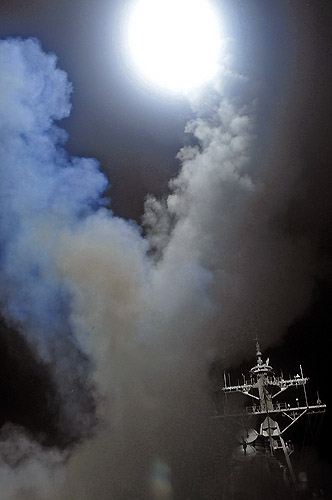Mounting a military operation against a dictator like Muamar Gaddafi does not mean suspending critical analysis of what it means for western “allies” to attack Libyan targets from the air. Putting together an analysis of the attack entails looking beyond the wartime public relations campaigns of the French, British, American, and Canadian governments designed to get public opinion onside, and lull critical minds to sleep.
The blog empirestrikesblack cites Belgian investigative journalist Michel Collon who has outlined five principles driving war propaganda:
1. Obscure one’s economic interests;
2. Appear humanitarian in work and motivations;
3. Obscure history;
4. Demonize the enemy; and
5. Monopolize the flow of information.
Libya is a rich oil producer. Unseating Gaddafi would open up new opportunities for western oil interests. Now is a good time to evaluate who has been making money with Gaddafi, and who stands to benefit if he is overthrown. The empirestrikesblack reveals the insurgent leadership maintain close links to western economic interests.
The main motivation given for the bombing of Libya by western forces is the need to protect the civilian population from bombing attacks ordered by Gaddafi on insurgents in eastern Libya, and stop an expected massacre in Benghazi by advancing armored divisions. When asked at a press briefing March 1 if there was evidence of bombing attacks on civilians, American Secretary of Defense Robert Gates replied “We’ve seen the press reports, but we have no confirmation of that.” U.S. Admiral Mullen added: “That’s correct. We’ve seen no confirmation whatsoever. Their statements confirmed what Russian military intelligence sources had previously reported: the attacks had never happened.
The history of Libya is largely unknown in the west. The insurgents themselves are flying the flag of the former Kingdom of Libya created by the British, and overthrown by Gaddafi in 1969. The colonial occupation of Libya by the Italian fascists was based on doctrines of racial superiority. What superiority is being claimed by the western bombers?
The leading British independent observer of Middle Eastern politics, Robert Fisk, is unwilling to defend Gaddafi, who is widely understood to be a dangerous maniac. For good reason, no one has come forward to defend the Libyan regime. Neither has it been widely reported that the economic and social disparities, and gross depravations existing in Egypt are much less evident in Libya, which has more wealth per person and a more balanced distribution of income than elsewhere in Africa. Though it is not well advertised, in Libya housing is available, and the unemployed receive an income.
As this war progresses, it may turn out that Gaddafi cannot hold on to power. The respected Middle Eastern correspondent Patrick Cockburn has written as much. The war is not supposed to be about regime change, but that must be the desired outcome from the perspective of France, Britain, the U.S. and Canada.
As the war progresses, and if it drags out, another set of issues will arise in the west. The Conservative perpetrators, Sarkozy, Cameron, and Harper all had good reasons to draw momentary attention away from their own domestic failings. Along with U.S. President Obama, none have built a domestic alliance for the pursuit of a prolonged engagement.
The important role of the media is to let us know about potential hazardous fire traps; reports about the latest fires not offering comparable value. The popular uprisings in the Middle East came as a surprise only because the situation in Egypt, Tunisia, and the Gulf States had been not been adequately reported, analyzed, and discussed from the perspective of democratic practice and social justice.
War reporting is a hazardous undertaking. It cannot be replaced by unverified information from government sources. Reporting the news accurately, and fully, cannot replace follow-up: democratic debate about what is being done in our names.
Duncan Cameron writes weekly on politics and is president of rabble.ca.



